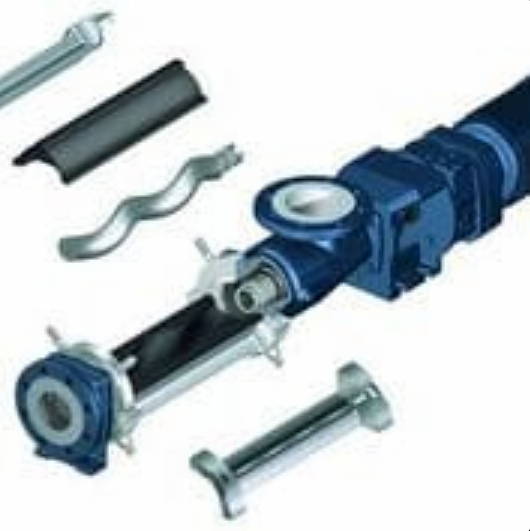Progressive cavity pumps are positive displacement pumps that use a helical screw to move fluid through a cylindrical chamber. They are also sometimes called helical screw pumps or eccentric screw pumps.
Progressive cavity pumps are often used to pump viscous, shear-sensitive, or abrasive fluids, and can handle both low and high flow rates. They can also be used to pump liquids with suspended solids, such as sewage or slurry.
Progressive cavity pumps typically have a higher initial cost than other types of pumps, but they can be more efficient and have lower operating costs over the long term.
How progressive cavity pumps work:
- Progressive cavity pumps have a rotating screw that is driven by an electric motor. The screw is encased in a metal or plastic tubing called a stator.
- As the screw rotates, it creates a vacuum that pulls fluid into the pump. The fluid then moves through the pump and is discharged at the other end.
- The speed of the screw determines the flow rate of the pump. Progressive cavity pumps can operate at very high or very low speeds, depending on the application.
Advantages of progressive cavity pumps:
Progressive cavity pumps have several advantages over other types of pumps.
- They are able to handle viscous fluids and liquids with suspended solids without damage or wear.
- They can also pump at very high or very low flow rates, making them suitable for a wide range of applications.
- Progressive cavity pumps are also relatively efficient, meaning they require less energy to operate than other types of pumps. This can lead to lower operating costs over the long term.
Disadvantages of progressive cavity pumps:
- Progressive cavity pumps have a higher initial cost than other types of pumps.
- They also require more maintenance and are more complex to repair than other types of pumps.
Applications for progressive cavity pumps:
- Progressive cavity pumps are used in a variety of industries, including food and beverage, pharmaceuticals, oil and gas, pulp and paper, and wastewater treatment.
- They are often used to pump viscous fluids, liquids with suspended solids, or abrasive fluids.
- Progressive cavity pumps can also be used to transfer radioactive liquids, dangerous chemicals, and other hazardous materials.
How to select a progressive cavity pump:
There are several factors to consider when selecting a progressive cavity pump.
- The most important factor is the application for which the pump will be used.
- Other factors to consider include flow rate, pressure, and power requirements.
- The type of fluid being pumped is also an important consideration. Progressive cavity pumps are well suited for viscous fluids and liquids with suspended solids. They can also handle abrasive fluids without damage or wear.
- The flow rate required by the application is another key factor to consider. Progressive cavity pumps can operate at very high or very low flow rates, making them suitable for a wide range of applications.
- The pressure requirements of the application are also an important consideration. Progressive cavity pumps can generate high pressures, making them suitable for high-pressure applications.
- The power requirements of the application are also an important consideration. Progressive cavity pumps are typically driven by electric motors, but they can also be powered by hydraulic or pneumatic systems.
Maintenance and repair of progressive cavity pumps:
Progressive cavity pumps require more maintenance than other types of pumps.
- They should be lubricated and inspected regularly to ensure proper operation.
- The screw and stator should also be inspected for wear and replaced as necessary.
- Progressive cavity pumps are more complex than other types of pumps and can be difficult to repair.
- They should only be repaired by trained technicians.
Conclusion:
Progressive cavity pumps have several advantages over other types of pumps, including the ability to handle viscous fluids and liquids with suspended solids without damage or wear. They may also be pumped at very high or low flow rates, making them suitable for a wide range of uses.
Related Posts













Adventures always bring a lot of new sensations and positive emotions, but if you have a faithful assistant next to you, then the result is even more positive, especially in the game for money started at the Netgame online casino and where the Crazy Monkey slot machine is launched. https://crazymonkey-slot.com Together with the monkey you will make an exciting journey to a desert island.